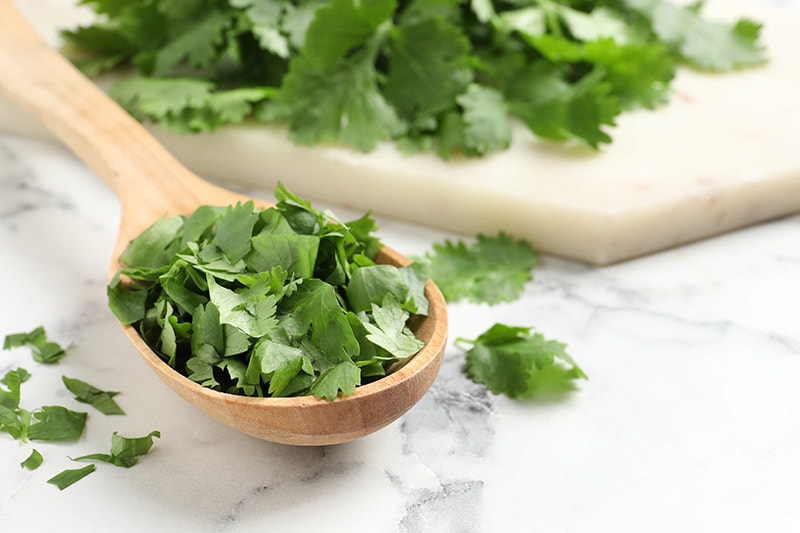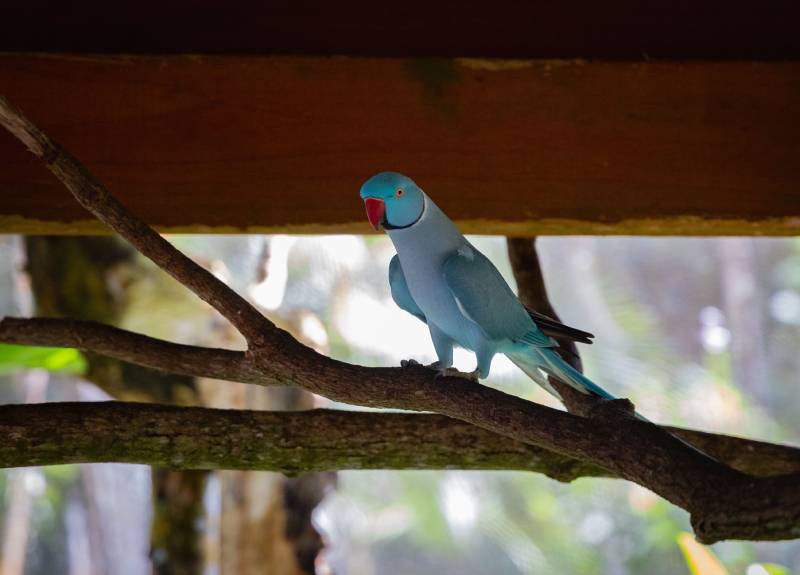Toucan vs. Parrot: Bird Comparison & Differences (With Pictures)
By Kit Copson
Updated on
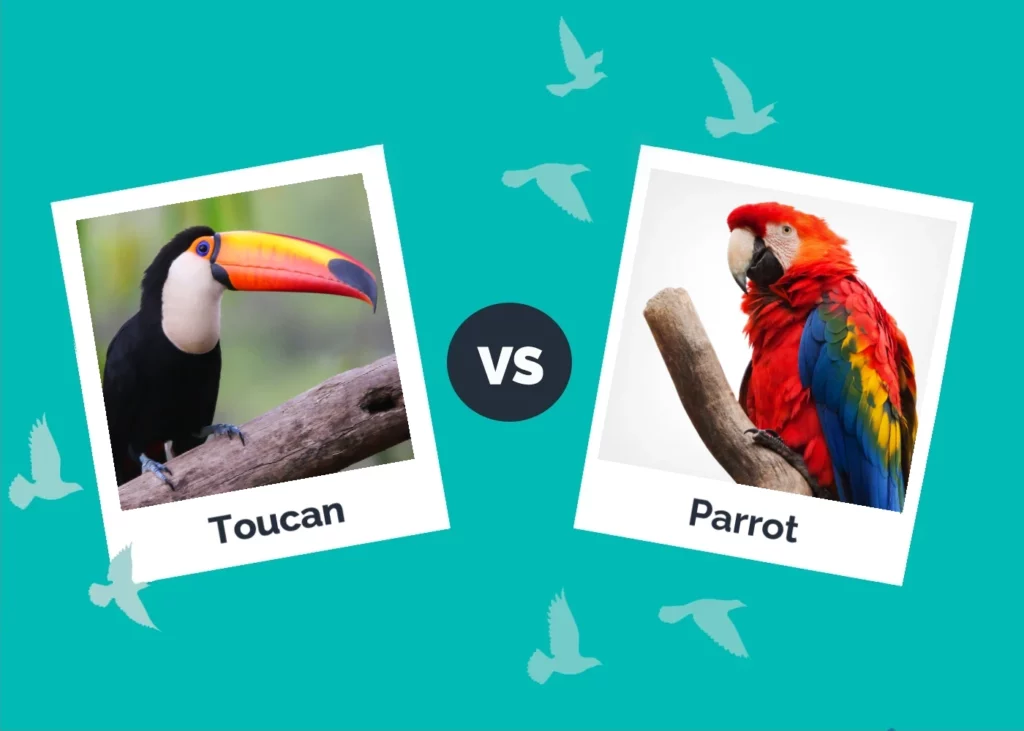
Click to Skip Ahead
Parrots and toucans are both stunning, brightly colored, tropical birds, leading some to wonder if the two are of the same family. Despite their similarities, parrots and toucans come from different families: Parrots fall into one of four families (Psittaculidae, Psittacidae, Cacatuidae, or Strigopidae), whereas toucans are from the Ramphastidae family.
While the smart and entertaining parrot is commonly found in bird lovers’ homes, toucans are a rarer choice of family companion because they’re especially hard to care for. That said, bringing home either bird is not a decision to be taken lightly. If you’re curious to learn more about what it might be like to live with a parrot or a toucan, keep reading.
Visual Differences
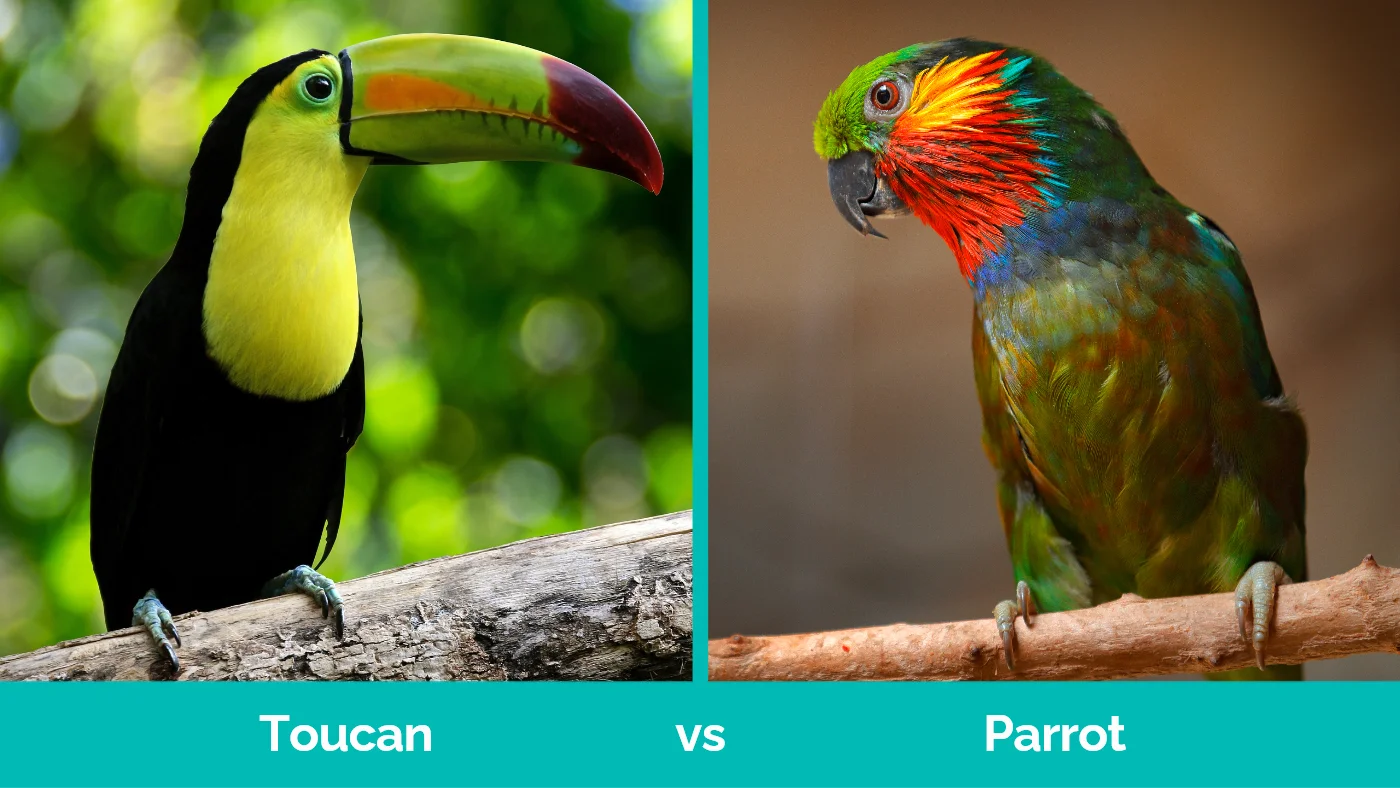
At a Glance
- Average length (adult): 3–40 inches
- Average weight (adult): 2.25 ounces—3.5 pounds
- Lifespan: 8–50 years (larger birds live longer)
- Exercise: 2–3 hours outside the cage per day (minimum)
- Grooming needs: Moderate
- Family-friendly: Sometimes
- Other pet-friendly: No
- Trainability: Intelligent, often friendly with socialization (depends on the species)
- Average length (adult): 12.5–24 inches
- Average weight (adult): 3.4 ounces–1.9 pounds
- Lifespan: Up to 20 years
- Exercise: Several hours per day
- Grooming needs: Moderate to high
- Family-friendly: No
- Other pet-friendly: No
- Trainability: Intelligent but very challenging to train
Parrot Overview

Parrots are (mostly) tropical birds, and most species can be found in Australasia, South America, and Central America. The four parrot families are incredibly diverse, containing more than 350 species.
When we think of parrots, it’s often the African greys and the Macaws that spring to mind, but cockatoos, lovebirds, parakeets, cockatiels, Amazons, and more are also in the parrot family. Parrots come in all shapes, colors, and sizes, and this diversity is a large part of their appeal for those who like to raise birds.
Character
Personalities vary depending on the parrot species you have. African greys, for example, are known for being sweet, affectionate, and open to being petted as long as they’ve been socialized well, though they tend to gravitate more toward one person in the home. They’re also famous for being great talkers, though they’re not known for being excessively noisy.
As for Macaws—which are also very popular with bird lovers—their personalities are often described as exuberant, bold, playful, and very loud, which makes them an unsuitable candidate for apartment living.
Then, there’s the Parrotlet, which is notoriously bold in spite of its tiny size and prone to territorial behavior. From these examples, it’s clear that parrot personalities are as diverse and colorful as the birds themselves, and the breed and how well the parrot has been socialized play roles in how they behave and interact with humans.
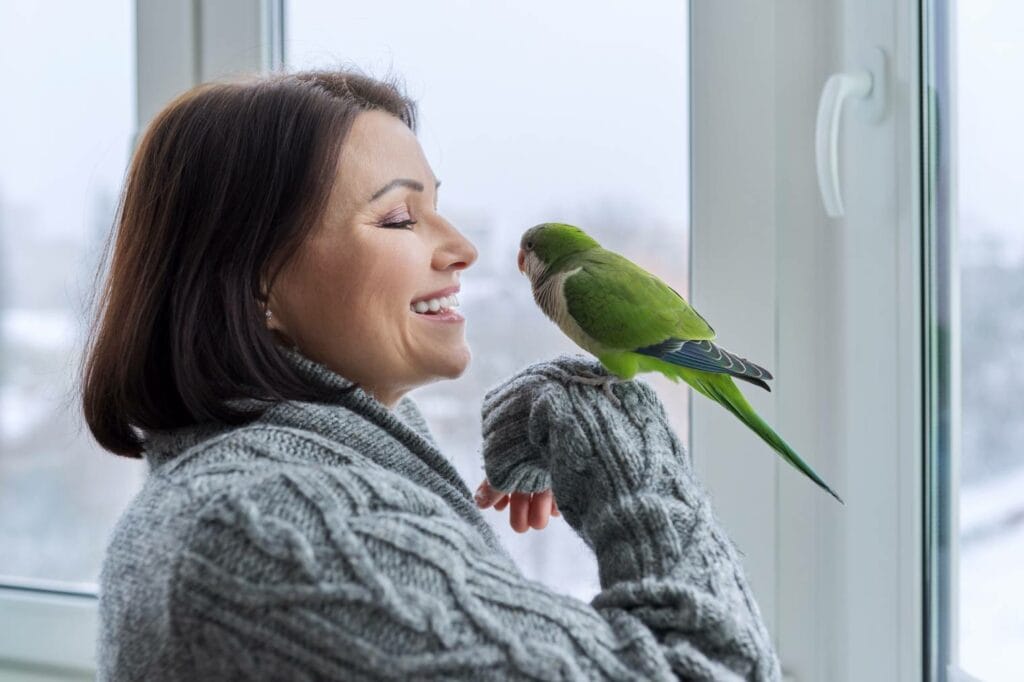
Training
According to information provided by the Texas A&M University School of Veterinary Medicine & Biomedical Sciences, parrot training should not focus on getting the bird to behave well or learn good manners but should rather be used as a form of mental and physical stimulation for the parrot1. These intelligent animals enjoy a challenge and thrive on learning new tricks.
As explained by Texas B&M College of Veterinary Medicine and Biomedical Sciences graduate student Connie Woodman, socialization and bonding with your parrot from a young age before training them is crucial.
Some tricks and behaviors you can teach your parrot (with the help of some tasty treats for encouragement) include:
- Step up (onto your finger)
- Fetch
- Play dead
- Wave
- Shake hands
- Go to the bathroom in a specific area
- Take a bow
- Dance
- Talk (lots of repetition is key for this one)
Maintenance & Diet
Care requirements vary by species, so it’s a good idea to research how best to care for the type of parrot you have and speak to an exotic vet for more detailed advice. To give you an idea, we’ll base this information on the general care and maintenance requirements.
There’s no getting around it—parrots are not easy animals to care for, and you should only get one if you can dedicate lots of time and energy to them. One of the most important requirements is an enriching and comfortable habitat.
Parrots need large, spacious cages with perches, things to climb on, food and water bowls, and toys. You can use paper to line the bottom of the cage, and you’ll need to change this daily to get rid of droppings and general cage mess (parrots can be messy). The cage should be cleaned thoroughly at least once per week with bird-safe soap and hot water.
As for dietary requirements, they may vary somewhat by species, but a parrot’s diet typically consists of seeds, nuts, berries, vegetation, fruit, and insects in the wild.
Domestic parrots can eat a commercial pelleted diet formulated by a reputable brand, and you can supplement this with seeds (in moderation—these are high in fat), and fresh fruits and vegetables (up to 20%–25% of the daily intake). Again, check with your vet how best to feed the species of parrot you have.
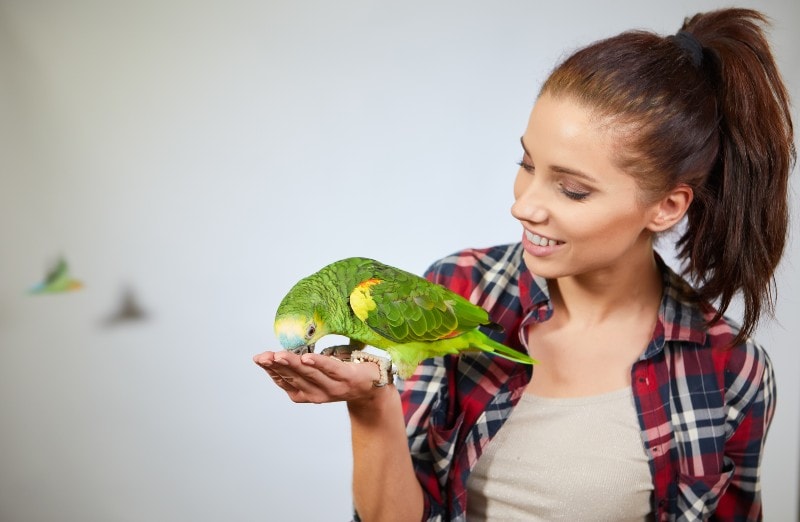
Suitable For:
Parrots are suitable for committed bird lovers looking for a smart, inquisitive, and entertaining companion. The ideal parrot parent is willing to collaborate with an exotic vet to learn about the species’ care requirements and arrange a clean and entertaining home environment for the bird.
Remember that parrots are diverse personality-wise, and some can be territorial, noisy, or high-energy. You’ll need to give your parrot plenty of attention and opportunities for enrichment and exercise and work on bonding with them early on to make parrot parenting a success. Please do not get a parrot if you think you might not have enough time to properly care for them.
Toucan Overview
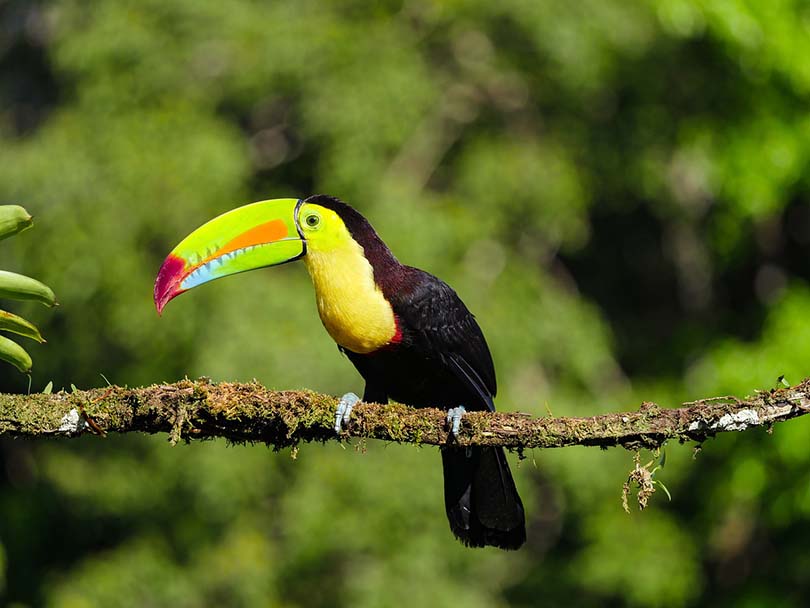
Toucans are native to Central and South America. There are more than 40 species of toucan, which is a fairly small number compared to the more than 350 parrot species.
Toucans are distinguished by their huge bills, which are about half the length of the body and adapted to help them reach for food on and in trees. The beak may also be a useful tool for self-defense. These birds are rarely kept as pets, though the most common species of choice are the Sulfur-breasted toucan and the Toco toucan.
Character
If you raise your toucan from a very young age, the bird is much more likely to develop into an affectionate and friendly companion. However, these animals are not domesticated in the way cats and dogs are, and it’s very difficult to socialize and tame a wild toucan. Toucans can be very territorial and aggressive toward other birds, and they can be especially dangerous around small birds.
If you successfully hand-rear a toucan to adulthood, they’re very active, inquisitive birds that like to explore their environment and play with toys. Some say that these characteristics make toucans great pets, but experienced keepers say that life with a toucan is far from easy, for reasons we’ll explore in the next sections.
Unlike parrots, toucans don’t talk, but they do make a rattling sound when they’re in a good mood.

Training
As mentioned, toucans are not domesticated animals. Their wild instincts are always at play, which makes it incredibly difficult to train them. According to Adventures in Toucanland, a site created by an experienced toucan keeper, toucans have a short attention span which, despite their intelligence, makes training a huge challenge.
The owner of Adventures in Toucanland goes on to explain that toucans are not the most well-mannered house guests—they’re simply not adapted to this kind of training and will do as they please in your home.
Toucans are very energetic and spend much of their time hopping around and exploring rather than chilling out in one place. Early socialization may help, but training success is far from guaranteed.
Maintenance & Diet
To cut to the chase, toucans are better suited to being cared for by experienced and qualified bird keepers rather than kept as pets in regular homes.
In addition to being difficult to train, another reason why most people don’t have toucans is that they need a very specific (and very large) type of enclosure with a lot of space, perches, and items for enrichment due to their high energy levels and need to be kept busy.
Toucans also poop a lot because they eat frequently, so expect to have to clean their habitat regularly and be prepared for an especially hard time if you house your toucan indoors.
As for diet, toucans need to eat a low-iron diet and must be offered fresh fruit daily, including some exotic fruits. In the wild, toucans eat lizards, bird eggs, nestlings, and insects in addition to fruit.
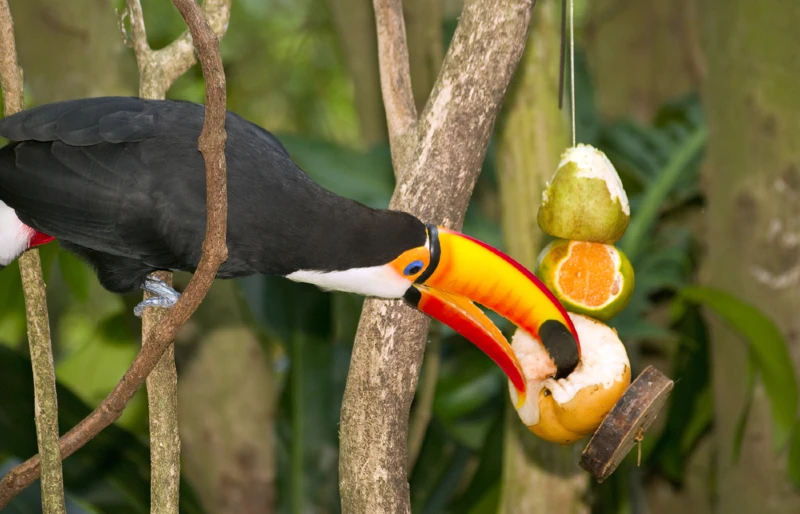
Suitable For:
Toucans are only really suited for those with specialist experience due to their specific needs in terms of environment and diet, low trainability, and how huge of a commitment they are in general. Sure, these birds are beautiful and fascinating, but, from what experienced keepers have to say, raising them is no easy feat, and these animals live for around 20 years, so make your decision very carefully.
Which Breed Is Right for You?
For those who love birds and are fully committed to giving a bird the best possible life, parrots are undoubtedly the better choice. They’re far from “easy” to care for and they’re certainly not domesticated, but toucans are on another level altogether!
That said, if you have experience with exotic birds and a setup conducive to the animal’s welfare, you may be able to make toucan parenting work, but it will be a challenge to say the least. On a final note, if you’re planning to adopt a toucan, be sure to check local laws, as ownership is illegal in some countries.
- Related Read: Cockatoo vs. Parrot: Main Differences (With Pictures)
Featured Image Credit: Left – zeedoo, Pixabay | Right – PublicDomainPictures, Pixabay



